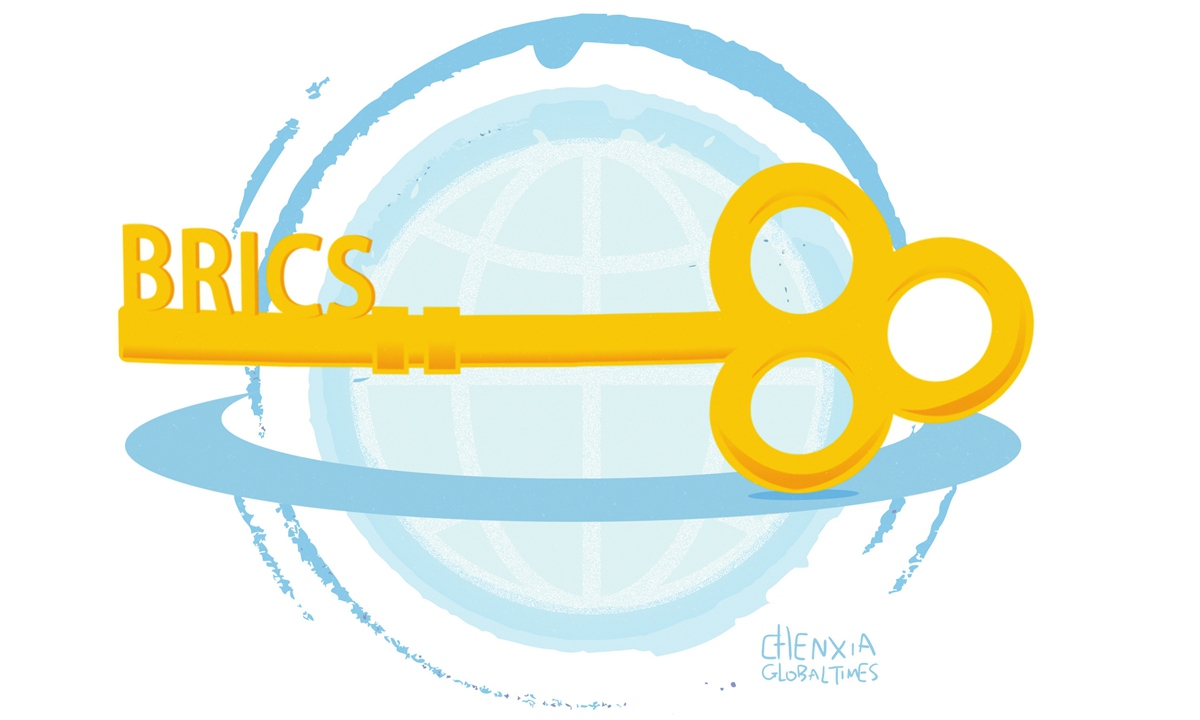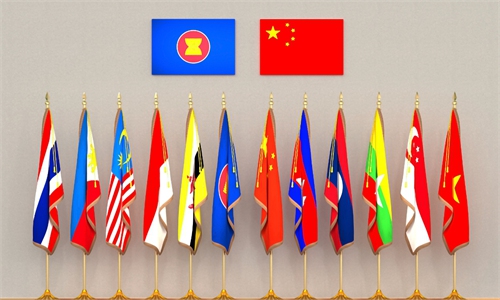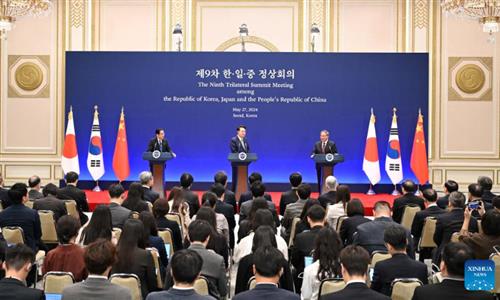'Greater BRICS' is an express train of development for 'Global South': Global Times editorial

Illustration: Chen Xia/GT
From October 22 to 24, the 16th BRICS Summit will be held in Kazan, Russia. This marks the first in-person gathering of BRICS leaders after the historic expansion of the "BRICS family," drawing widespread attention from the international community.
President Xi Jinping pointed out that BRICS countries are "at a crucial time to build on their past achievements and open up a new future for BRICS cooperation." The expanded "Greater BRICS" now carries more weight globally, marking a new historical starting point for BRICS cooperation.
From the Middle East to Africa, from Asia to Latin America, the expansion of BRICS is an inevitable result of aligning with globalization trends to promote win-win cooperation. The expanded "Greater BRICS" now accounts for nearly half of the world's population, with greater strength and broader representation.
As the "first echelon" of the Global South, the "Greater BRICS" not only holds the advantage of scale but also represents the resource and growth advantages of emerging market countries. At this stage, the economic output of the "Greater BRICS," calculated by purchasing power parity, has already surpassed that of the G7, making it a major driver of global economic growth. As the locomotive of the Global South and the engine of the world's economic recovery, the "Greater BRICS" is seeing growing influence and naturally drawing increasing attention.
The BRICS mechanism represents a strong voice for the Global South and is attracting more and more developing countries with its unique appeal. Among many international organizations, the enthusiasm for membership applications to "Greater BRICS" is rare. This fully demonstrates that this important mechanism of solidarity and mutual assistance among developing countries has taken root in people's hearts.
Recent public opinion surveys indicate that, in the eyes of people in most developing countries, joining BRICS helps promote economic development, improve trade levels, attract more investment, reduce reliance on the US dollar, and enhance their country's international standing. These align with the common, reasonable, and urgent needs of Global South countries. The expansion of the BRICS family shows that its spirit of openness, inclusiveness, and win-win cooperation is not just on paper but in action as well.
Additionally, the charm of the "Greater BRICS" lies in that in an increasingly fragmented world, it allows the Global South, which lags behind the West in economic development, to see the power of unity and collaboration, as well as the hope of catching up.
The development journey over the past 18 years has proven that the BRICS mechanism is an "action team" rather than a "talk shop." Through pragmatic cooperation, it creates incremental benefits. The headquarters building of the New Development Bank of BRICS countries, located in Shanghai's Pudong, serves as a flagship project for BRICS cooperation, providing essential financing support to member countries.
Additionally, the China-BRICS AI Development and Cooperation Center and the China-BRICS Science and Innovation Incubation Park for the New Era have also been established and launched. The BRICS cooperation mechanism has established an important platform for member countries to optimize resource allocation and share development opportunities, and it is further expanding into cutting-edge fields such as green development, aerospace, and biotechnology. These tangible and visible achievements of BRICS, along with more systematic and institutionalized cooperation, have made an increasing number of "Global South" countries realize that the "Greater BRICS" is a development express train that cannot be missed.
The "Greater BRICS" express train of our time not only carries the development hopes of the "Global South," but also serves as a backbone force in upholding and defending true multilateralism. The BRICS countries emerged from the wave of rising emerging market economies and developing nations. As the leading group of the "Global South," they have consistently dedicated themselves to promoting a more equitable and orderly multipolar world and inclusive economic globalization. Unlike the ideological offensive and defensive alliances formed by some Western countries, the BRICS cooperation mechanism embraces diverse political systems and economic development models. In BRICS cooperation, openness and inclusiveness are principles, win-win cooperation is the foundation, and fairness and justice are the goals. The BRICS mechanism firmly adheres to its role of "not starting anew, not engaging in camp confrontation, and not seeking to replace anyone," and it never exerts pressure on participating countries to "pick sides."
Since the expansion of BRICS, the international community has experienced a sustained enthusiasm for the "Greater BRICS," creating a positive atmosphere for the inaugural year of "Greater BRICS cooperation." Standing at this new historical starting point and ready for "Greater BRICS cooperation," we look forward to the Kazan Summit writing a new chapter of unity and development for the "Global South."
China will continue to work with all parties to promote the steady and long-term progress of "Greater BRICS cooperation."



